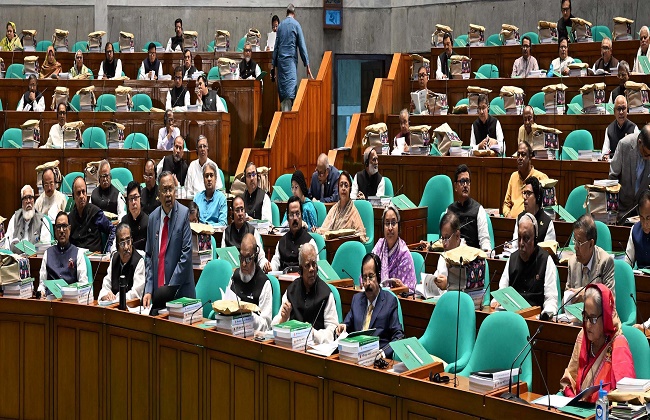
Finance Minister AH Mahmood Ali Thursday unveiled a Tk797,000 crore national budget for FY2024-25, the largest ever in Bangladesh, amid growing concern over the country’s economy.
The budget for the outgoing fiscal year was over Tk761,000 lakh crore. It means that the budget for FY 24-25 has seen an increase of 4.6 percent.
“In continuation of this, digital transformation, tax-net expansion, administrative capacity building activities are ongoing with the aim of increasing revenue collection from internal sources,” Ali said in his budget speech as the 18th finance minister of the country.
He said there is no alternative to increasing internal revenue to overcome this challenges the country has been facing.
The budget outlay includes Tk 2,65,000 crore for Annual Development Programme (ADP), Tk 5,943 crore for schemes, Tk 7,627 crore for special projects outside the ADP and Tk 2,884 crore for the food for work programme.
“Income tax plays an important role in establishing equality and social justice through redistribution of income,” he said, adding the average growth in income tax collection is more than 16 percent.
He said that this trend continues to increase in spite of the corona epidemic and slowdowns caused by overseas wars.
“A welfare-oriented and people-friendly income tax reform is an important tool to achieve this objective,” he noted.
Ali presented the budget, the first since the current government took office, in the parliament. It is also Ali’s first budget presentation as the finance minister.
Ali has kept the tax-free income limit at Tk 3 lakh, while tax is to be imposed by 30 percent if the individual annual income reaches Tk 38 lakh. The owner of more than one car has to pay an additional 10 percent tax as a surcharge.
In Bangladesh, the fiscal year starts on July 1. The proposed budget is the 53rd budget in the nation’s history and the 25th of the Awami League government in six terms.
Finance Minister said it is expected that pursuing all the “prudent policy measures” will help achieve GDP growth of 6.75 percent in the next fiscal year and 7.25 percent in the medium term.
He also said they are expecting that the inflation rate will come down to 6.5 percent in the next fiscal year as an outcome of the policy strategies that they have adopted.
The finance minister said this while placing national budget at JatiyaSangsad for the fiscal 2024-2025.
This is the first national budget of Prime Minister Sheikh Hasina’s government which took office for the third consecutive term after winning early this year’s general election.
In his maiden budget Ali said the GDP growth is maintaining its momentum because of the implementation of prudent and appropriate policy measures.
The average growth rate between FY 2009-10 to 2022-23 was 6.71 percent, one of the highest among all countries in the world, he said.
The country achieved a record GDP growth rate of 7.88 percent in FY 2018-19 just a year before Covid-19 pandemic.
“Despite all adversities caused by Russia-Ukraine war and other global unrests, Bangladesh managed to achieve 7.10 percent, 5.78 percent and 5.82 percent (provisional) growth in 2021-22, 2022-23 and 2023-24 respectively which is a testament to the inherent strength of our economy,” said the Minister.
To maintain this growth in future, he said, all reasonable supports will be continued to encourage the agricultural and industrial production.
Side by side, Ali said, proper implementation of important infrastructural projects and adoption of appropriate action plan aimed at increasing export earnings and remittances will be helpful for achieving the desired GDP growth.
The minister said demand for loan and the interest rate will be determined based on the supply of credit and the relationship between bankers and customers.
To control inflation, he said, various steps are being taken to make the monetary policy a successful one.
At the same time, Ali said, supportive policies are being implemented in the fiscal sector as well. “Government support like Family Card and OMS Programs are being strengthened to protect the common people from adversities arising from high inflation.”
